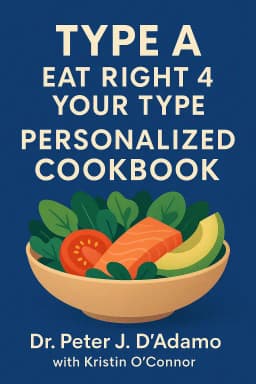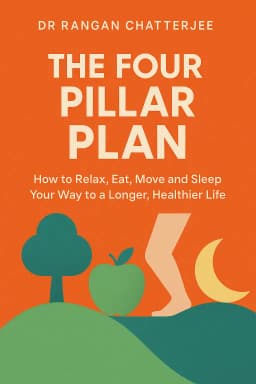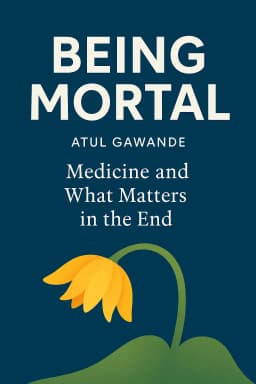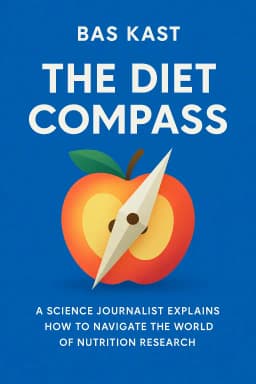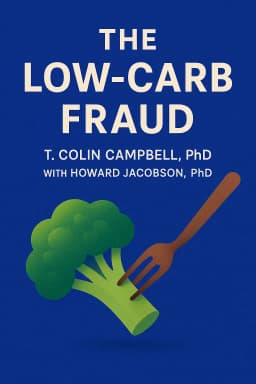
Personalized Podcast
Golden Hook & Introduction
SECTION
Nova: Have you ever felt like you need a PhD just to figure out what to eat for lunch? One day, fat is the enemy. The next, it's carbs. It’s exhausting. The book we’re diving into today, 'The Low-Carb Fraud,' argues this confusion isn't an accident—it's a multi-billion dollar business. It suggests that some of the most popular dietary advice is built on a foundation of clever marketing and flawed science.
onboard: It really is a dizzying landscape. You try to do the right thing for your health, and you're bombarded with these incredibly confident, yet completely contradictory, messages. It makes you want to just give up and order a pizza.
Nova: Exactly! And that's why I'm so excited to have you here, onboard. As someone who appreciates deep, analytical thinking, I feel like you're the perfect person to help us cut through that noise. Today, we're going to tackle this from two powerful angles. First, we'll act as investigators, uncovering how the low-carb diet was marketed into a global phenomenon.
onboard: I'm ready. It sounds like we're looking for the story behind the story.
Nova: We are. And then, we'll switch to being systems thinkers, exploring why focusing on weight loss alone is a flawed, and even dangerous, strategy for achieving genuine health. Sound good?
onboard: Sounds fantastic. Let's dig in.
Deep Dive into Core Topic 1: The Anatomy of a 'Fraud'
SECTION
Nova: Alright, so let's start with that first idea: the marketing. The author, T. Colin Campbell, makes a stunning point. He says the most impressive legacy of the Atkins craze wasn't weight loss, but a 'linguistic achievement.' He argues they managed to coin the phrase 'low-carb' and, in doing so, turned most plant foods—fruits, vegetables, whole grains, things we always thought were healthy—into dangerous, fattening no-nos. What do you make of that as an idea?
onboard: That's fascinating. It's a masterclass in reframing. You take an existing frustration—decades of bland, restrictive low-fat diets that people hated—and you offer a 'forbidden' solution. You're not just selling a diet; you're selling permission. Permission to eat bacon, steak, butter, all the things that were previously demonized. It's psychologically brilliant, even if, as the book argues, it's nutritionally bankrupt.
Nova: Psychologically brilliant is the perfect way to put it. It tapped right into that desire for an easy answer that also felt indulgent. But the book forces us to look at the trade-off. What was the actual physical reality for people on these diets? Campbell points to research—and this is the wild part—funded by the Atkins organization itself.
onboard: Oh, that's always telling. When the data is bad even when you're paying for it.
Nova: Right? So, let me paint the picture. Researchers took two groups of dieters. One group was on a so-called 'low-fat' diet, which in America is still not very low-fat, around 30% of calories. The other group was on the high-fat, high-protein Atkins diet. After a period of time, they compared the side effects. The results were just staggering.
onboard: Let me guess, it wasn't all sunshine and weight loss.
Nova: Not even close. In the Atkins group, 68 percent of people reported constipation, compared to just 35 percent in the other group. That's almost double. 60 percent of Atkins dieters had headaches, versus 40 percent. The list just keeps going: halitosis, or chronic bad breath, was 38 percent versus 8 percent. Muscle cramps, diarrhea, general weakness... all significantly higher for the people on the diet that promised them they could eat anything they wanted, as long as it wasn't a carb.
onboard: So the promise was 'eat bacon and get thin,' but the reality was... headaches and constipation? It's a classic bait-and-switch. The marketing sells you a dream, but your body pays the price. And the fact that this data comes from their own studies is the smoking gun. They couldn't even spin their own research to hide these very real, very unpleasant outcomes.
Nova: It really is. It shows this profound disconnect between the slick, appealing marketing message and the lived, physical experience of the diet. It was a financial success, but as the author says, a health-threatening one.
onboard: It makes you question the very definition of 'success' in the diet world. Is it book sales, or is it actual, long-term human well-being? The book seems to argue those two things went in completely opposite directions here.
Nova: That's the perfect transition, onboard. Because that disconnect between the promise and the reality leads us perfectly to our second core idea, which is maybe the most powerful metaphor in the whole book. It’s the idea of treating the symptom, not the disease.
Deep Dive into Core Topic 2: Painting the Lawn Green
SECTION
onboard: I'm intrigued. This sounds like it goes much deeper than just diet.
Nova: It does. It's a total shift in perspective. So, the author asks us to picture this: you have a homeowner, and their lawn is brown, dry, and patchy. It's an eyesore, a clear sign that something is wrong. The soil is unhealthy, it's not getting the right nutrients, maybe there's not enough water.
onboard: A familiar problem for many of us.
Nova: Indeed. Now, a lawn-care specialist comes by. But instead of suggesting they aerate the soil, add compost, and fix the sprinkler system, they say, 'I have a quick fix. For a small fee, I'll paint your lawn green.' And they do! The homeowner is thrilled. From a distance, the lawn looks lush and perfect for a few weeks.
onboard: But it's an illusion. The grass is still dying underneath. The root problem hasn't been addressed at all.
Nova: Exactly! The lawn isn't actually healthy; it just looks healthy. And the author argues this is precisely what low-carb diets do. They 'paint the lawn green' by causing rapid initial weight loss, which is mostly water weight. This makes people feel successful. But they haven't done anything to fix the underlying metabolic problems that might have led to the weight gain in the first place.
onboard: That is a brilliant framework. It's about confusing an indicator—the number on a scale—with the actual state of the system, which is our overall health. And worse, the book suggests the 'paint' itself might be toxic.
Nova: That's the kicker. The 'paint'—a diet heavy in animal protein and saturated fat—might actually be making the 'soil,' our body's internal environment, even sicker in the long run. It can increase inflammation, raise cholesterol, and as other studies in the book show, is linked to higher mortality rates over time. So you're celebrating a cosmetic fix while the foundation crumbles.
onboard: You know, we see this pattern everywhere, not just in nutrition. In business, a company might chase a quarterly profit metric by cutting R&D and overworking employees. The stock price might pop—the lawn looks green!—but they're destroying the company's long-term capacity for innovation and the health of their workforce. It's the same flawed, short-term thinking.
Nova: That's such a sharp connection. It's a universal problem of mistaking the map for the territory, the symptom for the cause. And in nutrition, the consequences are so deeply personal. The book is really a plea to stop painting the lawn and start healing the soil.
onboard: Which means redefining the goal. The goal isn't just weight loss. The goal is health. And those are not always the same thing. As the author cheekily notes, you can lose a lot of weight by getting cancer, but nobody recommends that approach.
Nova: A very grim but effective point! It forces us to ask what we're really aiming for when we say we want to 'improve our nutrition.'
Synthesis & Takeaways
SECTION
onboard: So, when we put it all together, it seems the book's argument is twofold. First, be a savvy consumer of information. Understand that a lot of what we're told about health is marketing, designed to sell a product, not necessarily to make us well.
Nova: Absolutely. Be a critical thinker. And second, be a systems thinker. Don't just chase the symptom, whether it's weight or something else. Ask what the underlying system—your body—actually needs to be healthy from the ground up. So we've seen how powerful marketing can create a nutritional 'truth' that isn't true, and how this leads to 'solutions' that just paint over the real problem.
onboard: And the common thread is that need for critical thinking—to pause and ask, 'What's the real goal here? Is it a temporary number on a scale, or is it sustainable, long-term vitality?' The book makes a powerful case that we've been pushed to focus on the wrong thing.
Nova: So, for everyone listening, and for us too, onboard, the takeaway isn't just 'don't do low-carb.' It's a bigger question to carry with us.
onboard: Right. I think the question is: What's a 'painted lawn' in my own life? What's a quick fix I'm using, in any area, that might be distracting me from addressing the real, underlying issue?
Nova: That is a powerful, thought-provoking question to end on. It takes this whole conversation and makes it a tool for self-reflection. onboard, thank you so much for helping us break this down today with such clarity.
onboard: It was my pleasure, Nova. This was a lot of food for thought, in every sense of the word.
